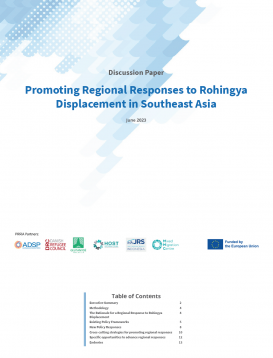Discussion Paper: Promoting Regional Responses to Rohingya Displacement in Southeast Asia
Over 1.6 million Rohingya remain in situations of protracted displacement in Bangladesh and the wider Asia region, including in Malaysia, Indonesia and Thailand. Major host countries of Rohingya refugees have resisted accession to the 1951 Refugee Convention and its 1967 Protocol. Concerned about ‘pull factors’ bringing more Rohingya and other refugees to their territories, and sceptical about equitable and predictable responsibility sharing, host governments have instead preferred responses grounded in immigration and national security law and policy. While Indonesia and Thailand have national refugee regulations, they are nascent and not designed to identify durable solutions for Rohingya refugees at scale.
Regional institutions are similarly inadequate and have not been effectively utilised to respond to the Rohingya crisis. Long term and sustained minilateral or other sub-regional responses have likewise proved elusive in the absence of regional leadership and political will. Conflicting and divergent priorities among regional host governments can disincentivise collective action, and the inertia of long-standing approaches to refugee policy have been difficult to overcome. Domestic political constraints, including growing antipathy toward Rohingya communities, have also stifled opportunities to explore greater coordination.
This status quo poorly serves both Rohingya refugees and their hosts. Rohingya face food scarcity and precarious security conditions in refugee camps in Bangladesh, and live on the margins in host countries in Southeast Asia with inadequate access to protection or basic services. In parallel, persistent conflict and instability in Myanmar make the safe, dignified, voluntary and sustainable return of Rohingya unrealistic in the short- and medium-term, particularly as the root causes of Rohingya displacement remain unaddressed. Since January 2022, there has been a significant increase in irregular movement overland and by sea of Rohingya seeking to leave Myanmar and Bangladesh—a trend that appears set to continue in 2023.
Regressive policy responses and their impacts have received regional and international media attention, reflecting poorly on host governments and deepening frustration among humanitarian actors. In November and December 2022, slow reactions to stranded boats carrying Rohingya in the Bay of Bengal and Andaman Sea recalled the 2015 Andaman Sea Crisis, and renewed scrutiny on pushback and search-and-rescue policies that violate international law. On top of reputational costs, punitive and deterrence measures have been costly and ineffective. Large-scale, prolonged detention of Rohingya, for example, is expensive and has not halted the irregular movement of refugees. For many, the risks of journeys overland and by sea are outweighed by poor living conditions in Myanmar and Bangladesh.
Recognising considerable barriers to achieving regional action, there are nonetheless strong arguments that regional responses could better protect Rohingya refugees and better serve the interests of host countries. Protracted Rohingya displacement is a transnational challenge, and the policies of host governments affect one another, for instance, where authorities push back boats or create conditions that incentivise irregular, onward movement to neighbouring countries. Regional responses hold promise for improving communication between host governments and creating interlocking commitments and fairer responsibility sharing arrangements. Similarly, they present opportunities to mobilise resources from outside the region in the form of technical expertise, multi-year financial assistance, and third country resettlement. Regional responses may also enable creative solutions that speak to a broader set of host government interests, including labour mobility schemes that address critical labour shortages while providing Rohingya temporary protection and safe and dignified work.
This discussion paper examines how humanitarian actors can strategically promote regional responses via global fora and regional institutions—namely the Association of Southeast Asian Nations (ASEAN) and the Bali Process on People Smuggling, Trafficking in Persons and Related Transnational Crime (Bali Process)—and in new or under-developed initiatives. It draws on the expertise of humanitarian actors, advocates and researchers to distil lessons from past efforts to promote regional responses, and to suggest recommendations for actions that could be taken both within existing frameworks, and toward new policy initiatives. The objective is to provoke discussion and encourage coordination toward creating a ‘political moment’ or policy window for meaningful regional action in response to protracted Rohingya displacement.
Recommendations for Humanitarian Actors
Existing policy frameworks
ASEAN
1. Advocate that the ASEAN Intergovernmental Commission on Human Rights (AICHR) and the ASEAN Commission on the Promotion and Protection of the Rights of Women and Children (ACWC) each be given a specific mandate to examine the regional situation for Rohingya refugees, and to make recommendations regarding ASEAN’s role in progressing a regional response.
2. Partner with receptive AICHR and ACWC representatives to spotlight the persistent plight of Rohingya in Myanmar and around the region, risks of future maritime emergencies involving refugees moving irregularly, the inadequacy of current approaches to Rohingya on the move and within host countries, and the need for regional coordination for more humane and effective responses.
The Bali Process
3. Urge the Bali Process Co-Chairs to strengthen their engagement with civil society and provide a sustained platform for consultation, particularly in relation to the activities of the Consultation Mechanism and the Task Force on Planning and Preparedness (TFPP).
4. Advocate for the Bali Process Co-Chairs to use the recent reactivation of the Consultation Mechanism to strengthen commitments to coordinate rapid emergency response efforts and more robust forward-planning and preparedness under the TFPP, including for search and rescue and disembarkation, and longer-term prevention measures such as access to basic rights in host countries and alternatives to detention.
5. Encourage Bali Process Co-Chairs to initiate an evaluation of the Bali Process’s impact, and take stock of lessons learned, and institutional and policy barriers to a more comprehensive regional response to Rohingya onward movement. Co-Chairs should mandate evaluators to consult with civil society to capture non-governmental observations, analysis, and other expertise.
New policy processes
An ASEAN refugee protection framework
6. Include promotion of a protection-centred and human rights-based ASEAN framework in coordinated regional strategies pressing for regional responses to maritime emergencies and protracted Rohingya displacement.
7. Ensure donor support for civil society initiatives aimed at improving refugee protection policies and outcomes at the national level, with a view over time to generating conditions at the regional level conducive to development of an ASEAN refugee protection framework.
A regional support platform
8. Urge Japan as co-convener of the 2023 Global Refugee Forum (GRF) to champion multistakeholder pledges to encourage burden and responsibility-sharing.
9. Coordinate regional and national-level engagement with Malaysia, Indonesia and Thailand to encourage a joint GRF pledge to develop a roadmap for a regional support strategy and support platform in conjunction with other joint GRF pledges to increase Rohingya access to legal status, healthcare, education, livelihoods and alternatives to detention in host countries.
10. In parallel, advocate that ASEAN member states develop a GRF pledge, either jointly or individually, to significantly increase support for the Joint Response Plan: Rohingya Humanitarian Crisis.
11. Support resettlement countries and donors to develop GRF pledges to expand third-country pathways for Rohingya and assist development of a regional strategy and support platform.
Third country resettlement & complementary pathways
12. Encourage Australia as incoming co-chair of the Annual Tripartite Consultations on Resettlement to solicit meaningful commitments to expand resettlement and complementary pathways for Rohingya.
13. Coordinate advocacy towards key resettlement countries including the USA, Canada, Australia and New Zealand, as well as countries in Asia and the Pacific, including Japan, Korea and the Philippines to expand resettlement and complementary pathway options for Rohingya.
14. Advocate for Rohingya to access education and work rights in host countries, which can promote social cohesion and better prepare Rohingya to access complementary pathways.
15. Ensure that family unity and the rights of the child are central to all policy decisions regarding resettlement and complementary pathways for Rohingya, including labour mobility pathways.
Cross-cutting strategies for promoting regional responses
16. Keep protracted Rohingya displacement, its regional implications, and the benefits of regional coordination high on the agendas of host governments, donors, ASEAN, ASEAN dialogue partners, the Bali Process, and other initiatives responding to the crisis in Myanmar.
17. Secure funding for humanitarian actors to expand consultations with governmental and non-governmental stakeholders and technical experts to further conceptualise regional responses, build requisite coordination capacity, support advocacy initiatives and resource policy dialogues and technical capacity building activities aimed at increasing regional coordination in response to protracted Rohingya displacement.
18. Support national and local civil society actors to increase their engagement with regional and international human rights instruments and mechanisms, including UN human rights complaints mechanisms and the Universal Periodic Review process; and to support governments at policy and operational levels to increase understanding of and implementation of regional and international human rights and humanitarian principles.
19. Continue to alert regional host governments and institutions to barriers to safe, dignified, voluntary and sustainable return to Myanmar for Rohingya in the short- to medium-term; encourage and support host governments to undertake medium-term planning that enables Rohingya refugees access to temporary legal status, healthcare, education, livelihoods and alternatives to detention; and impress upon them the prospective benefits of regional responses.
20. Counteract securitisation of responses to Rohingya displacement by broadening engagement with national and regional security actors; security-oriented academics, researchers and policy centres; and influential regional, security-themed publications.
The full version of the report can be found here.

